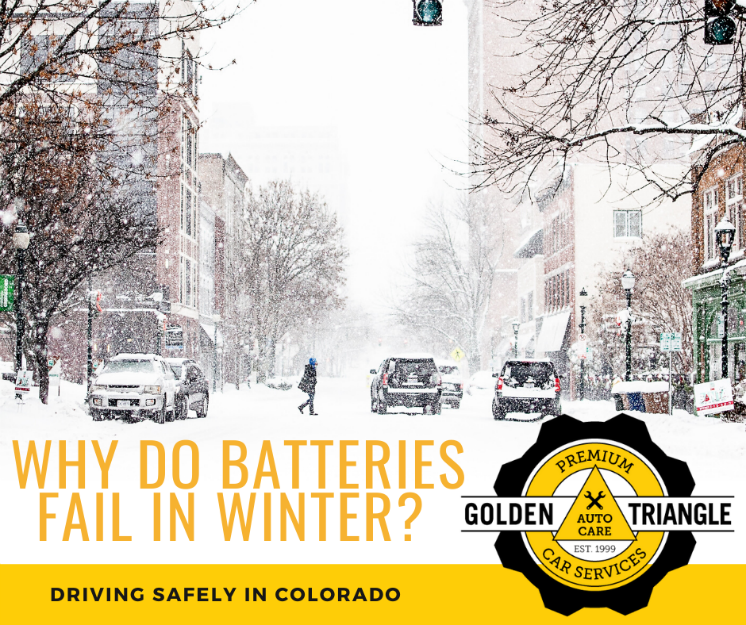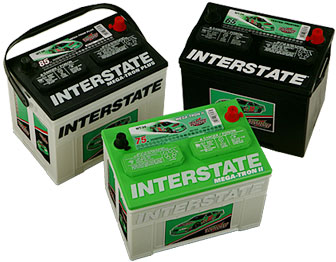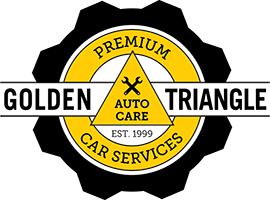
Call Us Now
303-573-1335
 Why do car batteries fail in winter?
Why do car batteries fail in winter?
“Cold weather can cause car batteries to go dead because damage accumulating through the summer months doesn’t show up until the battery is more taxed” advises Downtown Denver auto repair shop owner, Marc Zandell of Golden Triangle Auto Care. Summer’s high temperatures cause the electrolyte to vaporize faster and speeds up the corrosion of the internal plates inside the battery. A cold battery has reduced cranking power, and cold temperatures further challenge your car because your motor oil thickens, making it harder to turn the engine over. Today’s modern electrical and fuel systems can mask a weak battery by starting an engine with a minimum of cranking, but when a weak battery is further compromised by cold conditions, it’s more likely to fail.
We all owe a debt of gratitude to our car battery: it starts the show, gets our day or week off to a great start, keeps the in-cabin tunes flowing and all of your lights shining. When temperatures drop, that can take a toll on your battery as well. Especially when we go through sudden, deep cold snaps here in Denver, Colorado: “these conditions are the absolute worst for a battery and prime for battery failure” said Marc Zandell.
Just like all other components of your vehicle, your car battery requires proper maintenance and care to keep cranking out those morning starts. Take a look at these facts and maintenance tips regarding your vehicle’s compact power plant.
Dress for (Battery Maintenance) Success. Below you will find tips on working with your battery to insure good maintenance. However, before analyzing, be sure to accessorize – with proper eye, hand and clothing protection, that is – as your battery contains dangerous chemicals.
- It’s not Always the Battery’s Fault! When a car won’t start, the finger of suspicion usually points to the battery. Keep in mind, however, that improper care and maintenance of a vehicle’s other components and systems can result in flaws that drain power off the battery. Before we even get to our battery maintenance points, make sure you keep up with your regularly scheduled vehicle maintenance.
- Fixed in Place. The easiest and first step in battery inspection is to ensure that the battery is secured to its mounting bracket. A loose battery can become damaged, and possibly cause short circuits.
- Corrosion. One potential point of difficulty is the connection point of your battery cables. Insure that the connections are tight and free of corrosion. While you can find instructions on cleaning corrosion yourself, it’s best to have a qualified technician clean the terminals.
- Fluid Level. Your battery, like many systems in your vehicle, contains fluid that needs to be kept at a proper level. To correct a low level, add distilled water only. The other component of battery fluid is sulfuric acid, whose amount generally remains steady. It’s the water that can fluctuate due to evaporation and other processes. If NO fluid is present, it is likely the battery will fail soon, and replacement should be considered.
- A Clean Battery is a Happy Battery. In addition to keeping your battery from looking its best(!), dirt actually conducts electricity and can serve to drain energy from your battery. You can clean the battery case using a solution of regular warm water and baking soda, with a nylon bristle brush.
- Replacement. When your battery needs replacing, be sure to use the right size battery for your car. Consult your mechanic just to be sure.

What battery do we recommend? Interstate batteries are what we recommend and install in all of our customer’s vehicles. Not discussed today is the issue of when and how to charge your car battery, should the need arise. Different batteries may require different methods of charging, and there are also precautions to take when charging (for example, never charge a frozen battery, which can cause an explosion). Look for an upcoming blog from us on this subject.
In the meantime, talk to the guys at our front desk here at Golden Triangle Auto Care, downtown Denver’s premier auto repair center if you have questions about battery charging, checking your battery connections, and any sluggish morning starts you might be experiencing.
